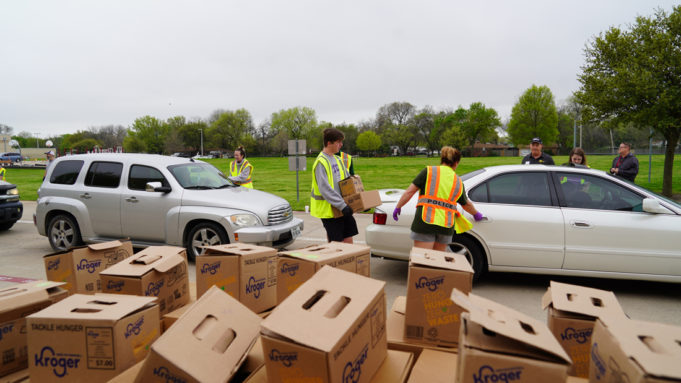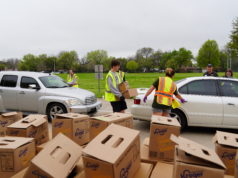Feeding Fort Worth’s homebound public school students and swelling unemployed ranks requires the cooperative efforts of dozens of nonprofits and faith-based groups that are strained and overextended. We reached out to two of the largest groups that are addressing the ongoing hunger crisis, Tarrant Area Food Bank and Fort Worth school district, to see how they are managing the surge in demand.
Tarrant Area Food Bank
Unprecedented layoffs are sending families to Tarrant County food pantries in record numbers. Julie Butner, Tarrant Area Food Bank CEO, said sleeping hasn’t been easy these last few weeks. Butner and her staff are putting in overtime as they work to innovate new programs that aim to meet the growing needs of food pantry lines. Demand for food donations has swollen by 50% in portions of the 13 counties that TAFB serves, Butner said.
Butner’s nonprofit is looking for a second distribution center that can stock food supplies to help service the 330 pantries that TAFB serves on a regular basis, and she is hiring staff to help feed a growing unemployed population that is seeking free meals.
“We are looking at an 18– to 24-month trajectory before we to return to normal after COVID-19 is handled,” she said, referring to a surge in demand which is estimated to add $1.4 billion in expenses for food banks across the United States. “Our peak demand will hit around mid-May, and then we have to come down the other side of it. Until the economy recovers, this is the new norm for food banking.”
Large grocery store distribution centers have stepped up to fill the void left by hoarders in local stores, Butner added. Panicked buying has led to shortages of staples like rice that would normally be donated to TAFB. To help offset the unexpected costs, Butner is asking the public to help if they can by donating via Tafb.org.
Thousands of elderly Tarrant County residents are being hit particularly hard. Many seniors fear they will contract COVID-19 if they leave their homes.
TAFB is partnering with Catholic Charities Fort Worth, United Way of Tarrant County’s Area Agency on Aging, Tarrant County, and Meals on Wheels of Tarrant County to address that problem through a new program called COVID-19 SNP. Individuals age 60 and older who do not have enough food to eat during the COVID-19 outbreak are eligible for supplemental food through this program.
Catholic Charities will deliver the weekly meals, which include a 10-pound bag of canned goods and produce provided by TAFB and five frozen meals (per person) that are provided by Meals on Wheels. Client referrals and inquiries can be made at Mealsonwheels.org or by calling 817-336-0912.
To ensure there are adequate resources for the project, TAFB is repurposing its Community Kitchen to assemble 2,000 meals a week.
Is Butner worried that demand will outstrip Tarrant County’s supply of food donations anytime soon?
Food shortages have “already happened at El Paso food banks,” she said. “It depends on what part of the country you are in. The long-standing relationships that we have built in this city have come into play when we pick up the phone and say, ‘We need help.’ ”
Fort Worth school district
The closure of Fort Worth school district’s campuses left 82,000 children without access to free or reduced meals. The school district, with the help of its food service vendor, SODEXO Magic, began offering meals to go at select campuses. Meal distributions of six meals will be given Mondays and Thursdays to reduce contact between school staff and the public. The program originally ran Mondays through Fridays.
The school district is partnering with TAFB to address food shortages for the families of students as well. Four mobile pantry sites will provide 5-pound boxes of nonperishable food to families on select days. The school district encourages parents to follow them on Facebook (Fort Worth ISD) or to download their mobile app for details and updates.
“The meals distributed in partnership with the Tarrant Area Food Bank were for all members of a family, adults included,” said school district spokesperson Clint Bond. “We are doing what we can to make sure that all children under 18 years of age, not just FWISD children, are fed, and students, families, and employees stay as safe as possible in the food distribution process.”












